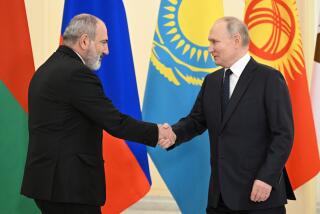Papandreou Hoping for Political Bonanza From First Visit by a Soviet Head of State
- Share via
ATHENS — Prime Minister Andreas Papandreou hopes that Soviet leader Mikhail S. Gorbachev’s visit this spring--the first by a Soviet head of state--will bolster his position and improve relations with Greece’s small but powerful Communist Party.
The Soviet Union also hopes to make propaganda gains from the visit.
Diplomats say they expect Gorbachev to proclaim a new peace initiative in this North Atlantic Treaty Organization country to an enthusiastic Greek audience.
Papandreou has seen a steady improvement in his relations with the United States run parallel with increased agitation from the left of his ruling PASOK Socialist Party and the Moscow-line Communists.
General Strike
The agitation culminated last week in one of the biggest challenges his government has yet faced--a 24-hour general strike supported by members of both the communists and conservative opposition.
The strike was called to protest a tough two-year package of economic austerity measures and came days after the government announced that it would spend nearly $1 billion to buy 40 American F-16 jets for its air force.
Greece sees the deal as yet another indication of improving relations between Athens and Washington, strained when Papandreou first came to power in 1981 on a platform pledging the removal of America’s four military bases.
Two years later, Papandreou bridled opposition to the signing of a new agreement allowing the U.S. bases to stay by expanding the Greek economy and granting generous hikes in wages and pensions.
Workers ‘Bought Off’
The economic expansion that followed, the influx of imported Western luxury goods and the rise in farmers’ incomes thanks to European Community subsidies “bought workers off, but only for a while,” said Constantine Georgiou, a Community Party official.
Bankers say that Papandreou is now facing the consequences of his inflationary policy.
“Papandreou cannot buy the workers off this time because he cannot borrow from abroad,” Georgiou said. “Instead, he is exploiting friendship with the Soviet Union for domestic gain.”
Moscow-line communists are themselves in a dilemma over Papandreou’s domestic and foreign policies.
‘A Difficult Position’
On the one hand, they say, Papandreou has supported Soviet peace initiatives and attacked U.S. foreign policy.
On the other, Greece’s first Socialist prime minister has introduced strict anti-strike legislation, has not hesitated to mobilize striking workers and has been accused of forcing a “drop in the working man’s standard of living while the rich get richer.”
With less than a year before Papandreou has to decide whether to renew the U.S. bases agreement again, “he’s in a difficult position,” a disgruntled PASOK insider said.
“Gorbachev’s visit can help both Papandreou and the Soviets,” he said.
Turkey Seen as Threat
An opinion poll indicated that Gorbachev’s visit would bolster Papandreou’s image among the Greek political left.
The poll, published in a weekly magazine last year, said that Greeks trust the Soviet Union more than the United States and regard NATO-ally Turkey as a greater threat than northern communist neighbors.
“How can we trust the United States when it failed to intervene to stop a Turkish invasion of Cyprus in 1974?” columnist Petros Kassimis asked.
The Soviets themselves have been careful to exploit Greek national sensitivities, supporting Greek causes in the Aegean and Cyprus and investing $650 million to build a modern alumina plant near Delphi.
More to Read
Sign up for Essential California
The most important California stories and recommendations in your inbox every morning.
You may occasionally receive promotional content from the Los Angeles Times.












